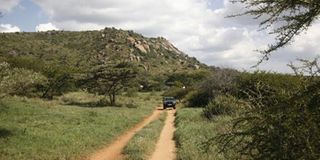Biocontrol insect not a threat, say officials

A view of Ol Jogi Wildlife Sanctuary. FILE PHOTO | PHOEBE OKALL |
What you need to know:
- The cactus-eating insect will not have an adverse effect on other plant species.
- Ol Jogi imported the insects last year from South Africa to help control the spread of an invasive cactus.
The cactus-eating insect released into the wild last weekend at Ol Jogi Wildlife Sanctuary is host-specific with no known adverse effect on other plant species.
Scientific solutions provider IAS-CABI Africa, which spearheaded the launch of the cochineal insect biotype (Dactylopius opuntiae “stricta”) on Ol Jogi’s 58,000 acre private ranch that is home to 45 black rhinos and 19 white rhinos, among other wildlife species, said that the insect posed no threat to any other plant.
“The same insect has been released in South Africa and Australia with no recorded non-target impacts. Here in Kenya we have two other cochineal insects — one on Opuntia monacantha and the other on Opuntia ficus-indica — these have been present here for decades and nobody has ever found them feeding on anything else other than the target species,” said IAS CABI Africa co-ordinator Arne Witt.
He added that CABI had also released agents on water hyacinth, water lettuce, Kariba weed and others where it had been proved that the insects do not feed on native plants or crops.
“Is it feasible to control cactus manually? Do the communities or anyone for that matter have to resources to chemically control thousands of hectares of cactus on invaded land? What other cost-effective options do we have other than biocontrol? If someone says that biocontrol is unacceptable then alternative solutions have to be proposed because doing nothing is not an option,” he said.
CHEAPER AND MORE SUSTAINABLE
Mr Witt, who is responsible for coordinating all CABI activities associated with Invasive Alien Species (IAS) in Africa, said that using biotype insects was cheaper and more sustainable than spending thousands of shillings on manual or chemical control, adding that “the money could be better spent on anti-poaching or rangeland restoration”.
Ol Jogi imported the insects last year from South Africa to help control the spread of an invasive cactus that is adversely affecting economic activities within the facility and at the neighbouring community-run Naibunga conservancy.
In a statement, Ol Jogi Limited’s spokesperson Elodie Sampere said they noticed an increasingly invasive cactus taking over large tracts of land, thereby diminishing pastures for its wild animals as well as indigenous livestock reared for commercial purposes.
Originally a species from South America, this invasive cactus has not only been seen in Ol Jogi but also in the surrounding community lands of Il Polei and Dol Dol.
“Biocontrol benefits everyone, if you are rich or poor, if you have a little or a lot of land — it is the most cost effective management strategy.
“It is also critical to note that biocontrol is not eradication but it is for effective control. We will significantly reduce cactus populations in Laikipia to a minimal level thereby making sure it is no longer a problem to our lush grazing fields for wildlife and livestock,” said Mr Witt.
He added that biocontrol agents would not drive any plant or insect species to extinction but was aimed at protecting natural pastures.
“If we do not manage Invasive Alien Species, we will lose more than 70 per cent of our natural pasture. In Kenya we already have lantana, parthenium, Mathenge, chromolaena and others that are rapidly reducing pasture production and we do not have the resources for chemical or manual control. The only viable option available to us is biological control,” he said.





